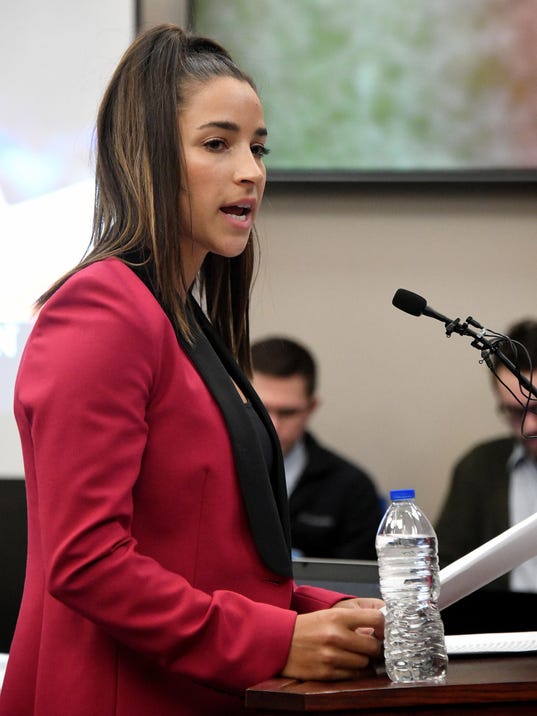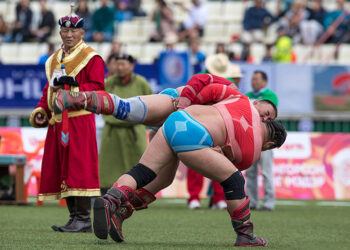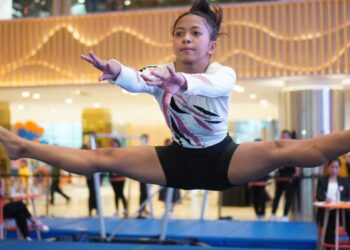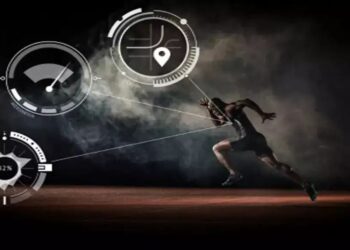
It’s a different courtroom now, different voices trembling with demands for justice.
But as the toll continues to climb this week, both in sheer numbers and in immeasurable emotional damage — this time in an Eaton County courtroom where dozens more victims of convicted pedophile Larry Nassar are detailing years of sexual abuse at another sentencing hearing — so, too, does the awareness.
That’s what makes this such an important moment. It’s a chance to educate young athletes and their families about the lessons we all should draw from the Nassar case, and the countless others before it that’ve been largely ignored. It’s also a chance to make our own demands.
“I don’t know if the victims would’ve come forward in such a powerful way if it had not been for the #MeToo movement,” said Nancy Hogshead-Makar, a former Olympic gold medalist and civil rights attorney who is a leading advocate for gender equity in sports. “But two things need to happen for survivors to be able to fully heal. One is they need to be believed that it happened. And second, they need to be believed in the depth of their emotional harm. …
“What these women have done is give the world a front row seat to see just how damaging this was for their lives. And the difference — before they spoke and after they spoke — was night and day.”
Before that dramatic sentencing hearing last month in Lansing, where 156 victim-impact statements were delivered over seven days, the case was still being publicly dismissed as “this Nassar thing,” at least in the obtuse words of Michigan State University trustee Joel Ferguson.
Since then, MSU’s president and athletic director have resigned, as has the entire board of directors for USA Gymnastics, with independent investigations of both organizations sure to oust others in the coming weeks and months.
“That’s a sea change,” Hogshead-Makar said.
Ensuring safety in future
But how do we see to it that this doesn’t happen again? Or, at the very least, what preventative steps can we take? Those are the important questions, the ones all of us should be asking — not just university administrators or sports federation officials finally responding in the face of public outrage. And that’s why Hogshead-Makar and other prominent voices were in the nation’s capital this week, pressing for legislation that was languishing on Capitol Hill.
Nearly 18 months after an Indianapolis Star report exposed USA Gymnastics’ failures to address sexual abuse complaints, Congress this week passed a bill — S. 534, the Protecting Young Victims from Sexual Abuse and Safe Sport Authorization Act — that requires governing bodies in amateur athletics to promptly report claims of abuse to law enforcement.
The bill, introduced by Sen. Dianne Feinstein (D-Calif.) and aided by lobbying efforts from Hogshead-Makar and many others, including several of Nassar’s victims, also extends the civil statute of limitations for abuse cases. And it requires amateur sports groups to develop specific monitoring and enforcement policies and procedures, from tracking coaches accused of abuse to limiting one-on-one contact between minors and adults.
Or to put it bluntly, “basic child-protection rules,” said Hogshead-Makar, 55, who won three gold medals in swimming at the 1984 Summer Olympics. “Most people are like, ‘You mean that doesn’t already exist?’ … And this affects 8 million young people. It will not have a small impact.”
Indeed, this is a big problem, largely because most parents either aren’t aware of — or simply don’t understand — the difference between school-based sports and club and Olympic sports when it comes to federal Title IX protections.
Now we’re seeing it playing out in court, though, and even as the criminal cases against Nassar come to an end, the legal wrangling will continue for months, if not years. Back in December, USA Gymnastics filed a motion to be dismissed from a civil suit filed by Nassar’s victims, arguing it had “no legal duty to protect plaintiffs” from his criminal conduct and, what’s more, no duty to warn other organizations, including Michigan State, about reported concerns.
It’s against that backdrop, then, many in the “powerful army of survivors” that Olympic gold medalist Aly Raisman described are joining the public outcry for more accountability, more education, more vigilance. Especially as more and more families steer their kids away from school sports and into a less-regulated arena, whether it’s travel soccer or baseball or hockey or club-level swimming and volleyball and gymnastics.
A time of reckoning
It starts at the top, obviously, and Hogshead-Makar points to research her Champion Women nonprofit organization conducted recently showing U.S. Olympic Committee and its national governing bodies — USA Gymnastics is just one of 47 — failing miserably on a variety of fronts. Less than a quarter of the NGBs surveyed were providing public lists of banned or suspended coaches, to cite just one example. The new U.S. Center for SafeSport needs better funding — that’s the next legislative push after this week’s S. 534 vote — and the pressure on the USOC and its sponsors will only mount as more victims are empowered to speak out.
But at all levels, this feels like a time of reckoning. A time to re-examine the culture of sports like gymnastics, described by former Olympic-level athlete Chelsea Kroll Williams at Nassar’s Ingham County hearing as one that “promotes fear of challenging authority, an environment that often breeds mental and physical abuse and a system designed to limit parental involvement.” And a time to recalibrate the thinking that leads parents to serve up their kids to profit-motivated individuals and clubs without truly calculating the cost.
“Most parents have been taught that you’re supposed to obey that coach,” Hogshead-Makar said. “You’re supposed to do what they tell you to do. And somehow, emotional abuse is OK in sports in ways that it’s not OK in other areas. That needs to change.”
The way to make change probably begins with those waivers parents blindly sign when their young kids join club teams and start forking over thousands of dollars in fees, as so many of us do these days. But it goes well beyond that, as experts like Hogshead-Makar offer suggestions about the kinds of demands we all should be making now, before it’s too late.
To help ward off monsters like Nassar, whose grooming techniques have been noted again and again by his victims in court, coaches and the club owners should be standing up before their teams and explaining the ground rules, with parents all nodding their approval.
“You don’t have to have a conversation about the birds and the bees,” Hogshead-Makar said. “But you can say a good, ethical coach will never try to be alone with you.
“A good, ethical coach will never give you a gift. A good, ethical coach will never text just you. They won’t be friends with you on social media.”
These are the kind of practices adopted long ago by other youth groups — Boy Scouts, the YMCA and so on — and perhaps the only explanation for why sports has somehow escaped that common-sense approach is all the money involved.
But if we’re truly listening to Nassar’s victims — not just hearing them, but “listening” to them — it’s time to do their voices justice, and demand more.
[“Source-detroitnews”]






